Drowned God: Conspiracy of the Ages 
Not every mystery has an answer. Yet we crave resolution, and if we can find meaningful rationale for a confusing series of events, we’ll take it. Drowned God: Conspiracy of the Ages knows this urge and uses it against you. The game fashions a grab-bag version of historical truth, raising nonsensical questions thrown together from tidbits from every religion and every corner of the world. Then it provides its own solutions, attempting to prove how its assemblage can explain all our questions about life and spirituality.
This only works if you accept that the game has some sensible interpretation of its ideas in mind, and if you want assurance in Drowned God‘s barrage of recurring signs and allusions, you have no choice. It tricks you into believing in conspiracy, placing paranoia above reason, and celebrating the discovery of grand unifying knowledge that exists because it has to.
You begin Drowned God in the Bequest Globe, a strange, ornate chamber gifted to you by an unknown benefactor. A voice rings out, claiming you have returned here from previous lives. It ushers you onto a journey in search of… well, it leaves that unclear. “Trust too deeply,” the voice warns, “and you will know the wickedness in men’s hearts. As above, so below. As above, so below. This is the secret of the Drowned God.”
What form that secret might take remains a total mystery as you enter the rooms of two dueling messengers, one fashioned after the Renaissance and the other resembling a modern boardroom. Their envoys send you on a journey to recover historical relics that may unlock more about the Drowned God. Soon you pass through the Cryptowheel – a Kaballah-invoking time machine – and visit mythological settings, each holding a relic and inevitably touched by the legacy of whoever the Drowned God is.
Within each of these “realms,” you have to solve the puzzles left behind at the ancient sites as safeguards for the relics. With each solution, you inch closer to the Drowned God’s secrets; everything you interact with reveals a piece of lore (a drawing, a journal, a sculpture, or what-have-you) suggesting, perhaps, aliens at the root of this. The game sneaks hints of the extraterrestrial across all manner of history and mythology, from Mesoamerican religion to the Knights of the Round Table. Most notably, it co-opts Tarot cards, both as foreboding symbols of alien activity and as a sort of supernatural currency.
The worlds unveiled in Drowned God draw from a well of hallucinatory imagery and body horror. Among old stone temples and mystical ruins, machines incorporate living parts, and a screaming torso wearing antlers serves as a signal for boats. Portals open and close, never revealing how they originate. The final section, set in modern Nevada, reimagines the sunset as an apocalyptic fireball that coats the world red. The game scores this with an oppressive soundtrack, mixing traditional instruments with jarring synthesizer stings that sound purposefully hostile. Through aesthetics, Drowned God immediately establishes its voice, unearthly and indecipherable.
The puzzles you solve unfortunately lack the same imagination. Usually, they adapt some physical puzzle, like Nine Men’s Morris or Lights Out, with little added context to relate them to the scene and story. They don’t add much anything to the game except a moment to sigh when you see another board game. But for the most part, they pass quickly. Drowned God wants to dwell less on the actions needed to figure out puzzles than the message they uncover.
The path forward is never hidden; you can only use items in areas that require them, reducing the need to click on every surface to see what happens. One telling puzzle, a water-powered alien organ, progresses regardless of what you press, as if the illusion of stumbling through a confusing alien device matters more than the actual act of solving it. The more thematically ambitious scenes, like an imagined conversation between Einstein and Newton about deism in physics or a bit where you erase evidence of the passage of time, are easy to complete, allowing you to reach their meaning more directly.
The game directs its attention instead to its looming question, the Drowned God’s secret that ancient aliens created humans. As best as I can tell from the cryptic clues, the game suggests that all world mythology draws from the story of aliens who became stranded on Earth tens of thousands of years ago and whose Atlantean civilization was lost to the sea. The Egyptians named them: Osiris was their emperor, the Drowned God. He was betrayed and murdered by his son Horus, who catalyzed the “primitive” human race. Humans conspired to hide this knowledge for generations, encoding it in art and the works of great thinkers. Modern experiments have disturbed these secrets, calling the aliens back to the planet. Your mission is to relearn history, retrieve alien artifacts with the power over time and space, and, maybe, determine the future of the Earth.
The specifics of the Drowned God’s history mean less than the implications of those secrets. In its pan-conspiratorial worldview, Drowned God sees connectedness. The voice in the Bequest Globe compares life to a wheel, always turning in place, like the clock on the Cryptowheel. Time moves in a cycle; people reincarnate. History repeats itself, and religious tenets converge – Kaballah, divination, the Book of Genesis, and Egyptian myth all retelling the same stories.
Relics like the Holy Grail have the power to fold time in on itself, bringing ancient and modern together. Einstein and Newton can have a conversation. The wooden and metal chambers of the messengers can exist alongside each other. The island of Avalon and Area 51 live on the same spectrum, each just another distant place to blame for the world’s legends. As above, so below.
Accepting Drowned God‘s argument calls for truly absurd logic. To begin even examining its ideas, you need to agree to its ridiculous terms, like the significance of numerology and a belief system where you can follow the direct lineage of Atlantis to Leonardo da Vinci. The conversation it wants to have makes no sense to an outsider. By the point when you’re attempting to understand how an alien corpse can hold the DNA for creating human-animal Manimal hybrids, you’re already too far lost in the game’s weird lexicon.
Only then can you try piecing together Drowned God‘s many loose ends. The game teases its secrets with infuriating vagueness, throwing around threads and motifs that may lead somewhere without ever connecting the dots. The icon of the moon turns up throughout the game, for instance, appearing in Tarot cards, visions, and illustrations of the Egyptian gods. But the game never explicitly links those references, leaving them out as stray data points from an unsolvable equation. Phrases, numbers, and symbols recur seemingly everywhere; repeated mentions of “Alpha and Omega” and the opening of Pandora foretell some great doom but never bring you closer to learning it. Direct explanations, like the offhand mention that “Stonehenge is a temporal gateway to fifth dimension,” just bewilder by introducing even more new concepts. You need to consult the glossary and journal in the game’s manual for more clarification.
Every clue leads to another, then another after that, feeding back on itself indefinitely. You can chase these ideas to seemingly no conclusion. I keep notes sometimes when playing games that I write about, and my notes for Drowned God were especially frantic and desperate for anything to ground me. Without some revelation, the game is a bunch of abstruse hints and disjointed puzzles. Surely it has a motive.
This is how a person becomes a conspiracy theorist. The search for patterns has no resolution unless brought together by some theory, however ludicrous.
To navigate Drowned God, you need to embrace conspiracy. The game pushes you to mistrust others and believe that something or someone has covered your eyes to reason. “Beware the trickery of others,” the game warns. “Who is false, and who is not?” Men in dark suits from the conspiracy staple organization Majestic 12 creep around scenes of futuristic interference, like a submarine commandeered to the Bermuda Triangle. The messengers in the Bequest Globe will try to win your trust by revealing new evidence of alien heritage, which the game frames as an attempt to butter you up rather than sincere assistance.
If you take these suggestions to heart – that everyone you meet deserves suspicion and may be trying to cloud your mission – the idea of a millennia-long coverup to conceal history that conveniently ties together all the difficult-to-understand evidence becomes much more appealing.
That’s what Drowned God loves about conspiracy. It’s like the alien organ puzzle, the thrill of solving something by desperately searching for a meaning that may not really exist. The details about Osiris and Horus aren’t important. What matters is the act of conspiring itself. Drawing connections from a miasma of metaphysical references and boogeymen is the entire point. The actual secret of the Drowned God is the notion that all world cultures are unified in their alien history, but what the game really reveals is the seductive, machinating mindset that would make you want to believe that.
A note about the developer
Drowned God was directed by British writer Richard Horne, also known as Harry Horse. According to an interview with GameSpot, the game was based on a forged manuscript that Horne wrote in the 80s, claiming to be a historical document from 1846. He planned to explain more in a sequel game titled CULT, but it was never produced.
Horne and his wife Mandy died in 2007 in what has been described as either a suicide pact, allegedly due to Mandy’s declining health, or a murder-suicide. The circumstances of their deaths have been disputed by their families, and it casts a troubling shadow over Horne’s work, including this game.
(This article was partially revised on July 2, 2020.)

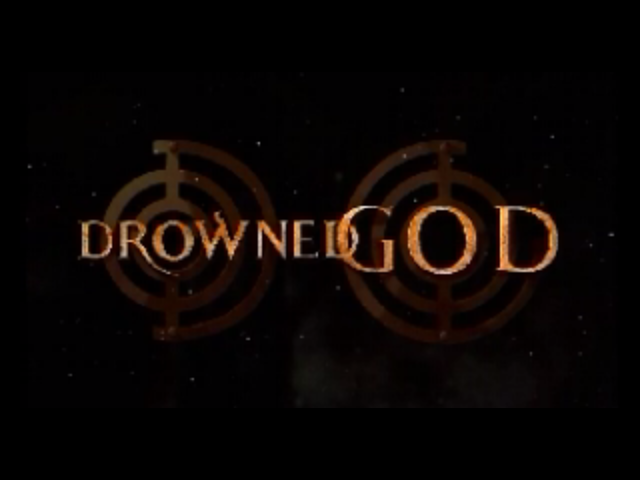
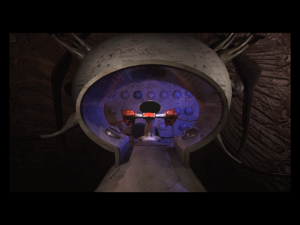
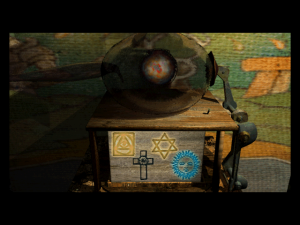
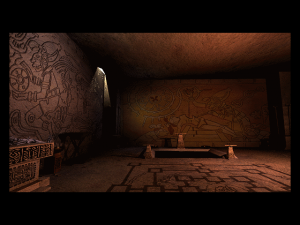
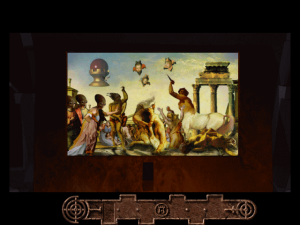
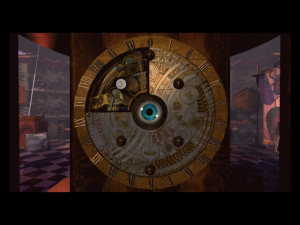
A nice summary. I enjoyed the game very much when it first game out, as a sort of conspiracy hobbyist, the kind of person who grew up reading the Illuminatus! trilogy and watching The X-Files faithfully. I suppose looking back it’s no surpise it was a bit of a hot mess, but I like how you have noted it somewhat requires adopting a conspiracy-theorist’s mindset. Maybe it’s more of a comment on this kind of delusional, paranoid thinking than any suggestion of a grand unified theory in earnest.
OK, I just did some more reading, and apparently Harry Horse was perfectly serious. Yikes. Also, he horribly murdered his wife in 2006, very likely inspiring the interactive Black Mirror episode _Bandersnatch_: https://www.reddit.com/r/blackmirror/comments/aex6ba/bandersnatch_irl_harry_horse_drowned_god/
While I certainly don’t argue the game as released strikes one as an incoherent mess of ideas and plot threads – I myself recalling dismissing it upon first seeing it as a fool’s errand at creating ‘a unified theory of conspiracies’ – I’ve since come to reconsider what Harry and company were trying for here. Now I see “Drowned God” is a wholly different kettle of scallops and calamari from the kind of straightforward, puzzle-based RPG one was led to expect.
WARNING: heavy spoilers and long read ahead.
There is a story here that plays out as the player clicks their way through places that defy logic and history, and Phil Salvador is correct one would have to suspend both belief and simple common senses to accept the wild premises involved if one approaches it as an ordinary experience. Except I now see the spatial realms that we explore and puzzle through as something other than advertised.
The first one in the game as released – Binah – is visually a version of Dark Ages Britain/Britannia under King Arthur (or whatever his name really was), which the game properly makes dreary, dirty and about as welcome as a graveyard. Yet beneath the surface is a workshop that looks to have belonged to Leonardo Di Vinci, complete with an artificial man, and a room where the conjoined effigies of Sir Isaac Newton and Prof. Albert Einstein argue over how the universe is arranged. The three things simply don’t align or objectively have anything to do with one another…unless one considers that all three are little more than mythical memes that underpin our understanding of things.
King Arthur is held as some kind of paragon of virtue or the like, Da Vinci a genius of many fields, and both Newton and Einstein as thinkers who clarified the natural order of the universe. The truth of course is that none of them were any of these things: Arthur was a warlord who ruled through force in a brutal and ignorant era, and who died in a stupid battle; Da Vinci may have been a genius (of a sort), but always stated his primary education was in fortifications and machines of war; and neither Newton nor Einstein explained the whole of things, merely parts of the whole (doing so incompletely at that).
Binah is a mirror for our sad tendency to latch onto myth at the expense of observed truth. It’s an admirable trait in some ways, as it means we’re capable of abstract thought and have long memory, but as dictators and fantatics across history have demonstrated, imagination of myths can lead to atrocities. I think Voltaire warned about that as well.
Then there’s Chesed, which was meant to be the first destination, apparently an island where you find Mesoamerican pyramids alongside a sunken nuclear submarine from the 1960s and something claiming to be “Noah’s Ark” (except it all seems to be made out living, breathing tissue). Based on the fact there’s a crashed TBF torpedo bomber that appears to be part of the lost Flight 19, you can naturally presume its in the Bermuda Triangle. But then how does that explain the pyramids, or “Noah”?
Granted the pyramids how their own secrets – an anti-gravity ray powered by the sun, a particularly aggressive game of Nine Mans Morris and a submersible made of brass and stone among them – and “Noah” proves itself to be a “gene ark”, capable of projecting, possibly even making new life by mixing genes. Its the sunken hulk of the USS Scorpio, found sunken off the coast of the island, that holds the strangest secrets of all, among them apparently a working model of the mysterious engines that are at the heart of the ‘Philadelphia Experiment’ story, engines that when activated not only disappeared the crew to who-knows-where, but opens a path to acquire a device – oddly named The Staff of Ra – capable of changing the face of a planet in mere moments through catalystic conversion of molecules.
The common thread within Chesed? The arrogance of technological development brings, and the disasters that inevitably result from the same. Chesed stands as testament to humanity’s cleverness and hubris, plus the unpleasant reality that there things cleverer than ourselves somewhere (even if they, too, are plagued with the same hubris and fall to folly, as pictograms in another temple there demonstrate).
After there is Din, a most inaccurate name for a place (even if it isn’t a “place” in the conventional sense) there ever was, given its absolute silence. As with the other realms, there are four points of interest: a steampunk control capsule which appears to control nothing, a house on rail-lines that appears to be naught but a reading room and a hidden Masonic temple, a sub-surface machine that creaks and groans and moves to no discernable purpose whatsoever, and finally a secret portal accessed through a steampunk subway linking these places that leads a 20 Century travelers’ caravan.
Yet there is purpose to this place: the machinery hides a self-styled “Theatre of Memory”, within which are the preserved presences of psychologist Carl Jung and occultist Alastair Crowley. Talk about a complete mis-match, which ultimately is the point of this place, because Din is a representation of a thing that is both the most silent, yet perpetually *loud* place a person can know: the human mind. What a piece of evolutionary perfection it is: neurons endlessly firing, capable of interpreting the minutest stimuli into clear information and regulating the operations of the many complex processes that allow the human form to function, all entirely without conscious effort or intervention.
Yet how do we use this marvelous device? Creating trivialities, navel-gazing pondering of the mind itself, building over-elaborate machines that barely function properly, telling ourselves stories that lead nowhere, and hiding from others and ourselves behind masks of reputation or fame. Did you know Crowley was among the most accomplished mountaineers known, or that Jung had a falling out with his contemporary Freud over a female student? No fear if you didn’t, as their better known for the controversies they generated, rather than their respective and vital humanity.
Wonder if Harry wasn’t projecting something when he selected those two for the game.
And finally, we come to the last and least known realm: Chokmah. This place is paradoxically the easiest to reach, yet we’d never find it, because its the one and only thing that is always coming yet never arrives: the future. Harry makes clear from the outset we arrive in the Four Corners Area of the American southwest, but its a time and place of growing chaos and madness, when conspiracies have become such common fare we no longer trust those around us. What little we see of this place in the game – a length of fence and barbed wire with WARNING signs clearly visible, an abandoned roadside diner where a radio broadcasts odd messages that are addressed to the player directly, the caravan we’d previously encountered in Din where we discover (and disable) a classical alien implant in the player’s brain – tells us nothing beyond this save that there is much, much more to see.
And here is where Harry the japster cleverly left clues for what should have been: back in Din are a series of murals found in the Theatre depict the realms. They make no sense unless one has already gone through them, in which case they make perfect sense. Chokmah’s is there as well, and makes clear that we would enter a subterranean city (inhabited by gods alone know what) before being taken to the Great Pyramids of Giza and whatever might have laid there. The Tarot card “The Hanged Man” is visible in this mural, thus indicating trial and circumspection and wisdom are involved here. A perfect metaphor for the entire game.
I would be remiss in not pointing out how the nominal puppet masters of the game, Kether and Melchet, who while position themselves as enemies, yet ultimately direct the player to follow the same path and seek the same objective. They waste many words trash talking the other side, and ultimately prove more than slightly hypocritical given their respective endings to the game. Kether offers a lengthy soliloquy pledging eternal resistance to the ‘shackles of the state’ and their celebration of chaos (presumably as a stand-in for freedom), while the ending they lead to is that of a technocratic police state. Meanwhile Melchet talks up the purity of ‘the garden’ and keeps casting everything in religious terms, yet their endgame is a world where all inhabitants are forcibly modified into something different than how nature made them.
Harry originally intended the game to have a unique ending for each of the numerological identities (9 in all), but we were left with just three: Kether’s police state that makes Orwell’s nightmares appear tame, Mechet’s “garden” of non-discretionary genetic alternations to all, and a direct audience with the alien Grays who intone “We are coming, and we are legion. You may return to us in the time of revelations. We will wait. We will see you again.”
So what does all this ultimately mean when we’re witness to myths constructed and supplanting complicated truth, the wreckage created by the hubris of technology, given a tour of the complexities and banalities of our minds, provided a glimpse an unrealized future we cannot even guess at even as we live in fear of it (given we’re already living in it), and having to listen to nominal leaders of oppositional parties who both talk a lot but ultimately say very little?
This was no mere game of puzzles and portends and alien conspiracies, it was an examination of humanity itself.
At least that how I look at it right now. Ask me tomorrow, and I’ll likely see something different. The fact I can’t think of another game that covered the same territory, never mind as creativity, is to the designer’s credit. Its incomplete nature, the effect of corporate politics and intrigues, left open the promise of a sequel that, alas, never reached fruition. Given computer adventure games are making something of a comeback, mayhap Harry’s vision will be realized somehow. In my correspondence with him 16 years back, he’d hinted that the original game materials were ‘in the can’ before it got butchered by Inscape; mayhap its sitting in some storage site somewhere.
Well, that was a long exhale, wasn’t it? I hope you found it interesting.
I just wanted to say, Mr. Conell, your breakdown of the game was extremely enlightening, just as this article is. Thank yiu for typing that up, and know that at least someone appreciates it 🙂
Sam, I think you misinterpreted Deus Ex role, and presentation. People like it because it’s fun, playable media, that touches on power, progress, corporations, and resources, and builds up on popular shows and books (including cyberpunk). It’s by no means a serious take on conspiracies, and is done to speak more of a future, than dwelling on past. Thus it’s free of toxicity and disease of conspiracy theories (and has its own share of problems). Thing is, games discussed here have nothing in common.
If people talk about Deus Ex, touching on conspiracies, they talk about imaginative media to roleplay in, and they talk mainly about cyberpunk. Means they have vague idea of what people liked to digest in 80–90s as a kind of entertainment. That’s the way people gamify sources, that might have roots in problematic ideas. As Cthulhu now is popular, nevermind its creator.
@Sam – that’s a fair analysis, though to me it hinges on the idea that Harry was intent upon preaching out bizarre notions in any forum available, and I saw nothing of that based on my own correspondence with him (old fashioned letters, btw, no email). I will likewise grant that the hacker’s files in Din were as you describe them: a mish-mash of conspiracist tripe that wraps so much together it surpasses raw incoherence and trips into the absurd.
Which is pretty much what you’d expect from a damned video game that took a wide range of fringe material from an even wider range of sources and wove it all into something meant to be at least marginally coherent. Hence my interpretation that it was an examination of the various dimensions and failings of the human condition. I heavily doubt that was Harry’s original intent, but it wouldn’t surprise me if it was an unconscious intention of his.
As for Harry’s politics and personal beliefs, I’m afraid those will remain forever more a mystery to us, as well as how much of them actually influenced his work and his output. We can see so much there, but how much was deliberate versus unconscious interest is beyond our ken.
Myself, I’ll take the man as I knew him, which was a complex and oft-contradictory character who had a special joy to his life, even as the core of that life was slowly declining in health. I don’t know the true circumstances of his death, but what little is known lead me to think calling it “Jonestown” isn’t accurate.
For the game, it stands as an ambitious and controversial effort. I like replaying it because its fun and one can still find nuances previously missed even now, over 25 years since its release. Its visual poetry, and thus means different things to each viewer and player. As I’ve said before: ask me tomorrow and I might view it in a different light.
That’s life and art, eh?
Hi folks! This article received a lot of attention this year as a result of a YouTube horror video about the game and its author. While I’m glad to see more people engaging with this game, the volume of discussion here in the comments has gotten a bit out of hand. (See: a comment above that’s as long as the actual article.) In particular, the speculation about Harry Horse’s mental health and the circumstances of his death — which was a focus of the YouTube video — is inappropriate.
Earlier today, PC Gamer published an article about Drowned God and linked to this post (hi PC Gamer readers!), so just in case, I’ve decided to lock the comment section. I appreciate the interest, but I also think it’s probably best to close the discussion here.
UPDATE (5/6/25): I removed some comments on here per the commenter’s request, in case the previous conversation seemss a little disjointed.